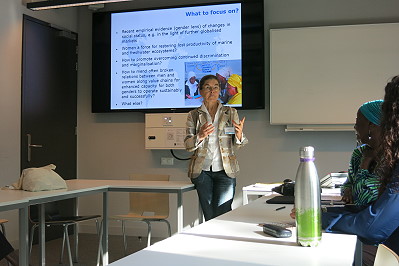
What's been on by the Argentinean team in October 2019?
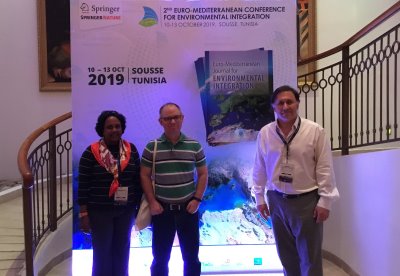 The Mundus maris team in Argentina had a busy month by contributing to the 2nd Euro-Mediterranean Conference for Environmental Integration, held 10 to 13 Oct. in Susa, Tunisia, and at the VI National Congress of Biodiversity Conservation, convened from 15 to 18 Oct. at the National University of La Rioja, La Rioja capital, Argentina.
The Mundus maris team in Argentina had a busy month by contributing to the 2nd Euro-Mediterranean Conference for Environmental Integration, held 10 to 13 Oct. in Susa, Tunisia, and at the VI National Congress of Biodiversity Conservation, convened from 15 to 18 Oct. at the National University of La Rioja, La Rioja capital, Argentina.
Training on novel fish stock assessment supporting West African management
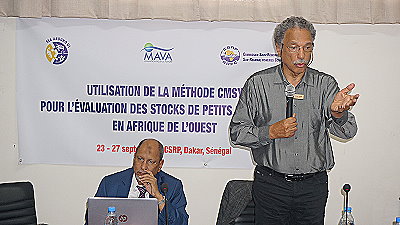 The quality of statistics about West African fisheries has often been criticised, mainly because the data about catches, biomass estimates and other key features assessed by national research institutes and sector administrations are frequently incomplete and not up-to-date.That means few stocks can be confidently assessed with conventional data-intensive methods. This is where a new algorithm (CMSY) based on only catch and resilience estimates comes to the rescue of robust management in such data poor conditions.
The quality of statistics about West African fisheries has often been criticised, mainly because the data about catches, biomass estimates and other key features assessed by national research institutes and sector administrations are frequently incomplete and not up-to-date.That means few stocks can be confidently assessed with conventional data-intensive methods. This is where a new algorithm (CMSY) based on only catch and resilience estimates comes to the rescue of robust management in such data poor conditions.
Strikes for climate protection - 20-27 September 2019
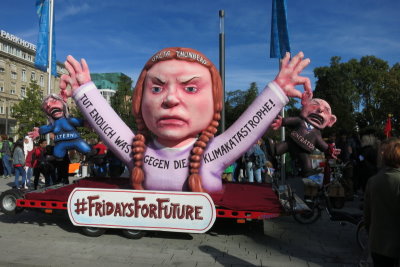 20-27 September 2019, we saw a record 7.6 million people take to the streets and strike for climate action. The biggest climate mobilisation in history. From Jakarta to New York, Karachi to Amman, Berlin to Kampala, Istanbul to Québec, Guadalajara to Asunción, in big cities and small villages, millions of people joined hands and raised their voices in defense of the climate.
20-27 September 2019, we saw a record 7.6 million people take to the streets and strike for climate action. The biggest climate mobilisation in history. From Jakarta to New York, Karachi to Amman, Berlin to Kampala, Istanbul to Québec, Guadalajara to Asunción, in big cities and small villages, millions of people joined hands and raised their voices in defense of the climate.
Sunday without cars in Brussels, 22 Sept. 2019
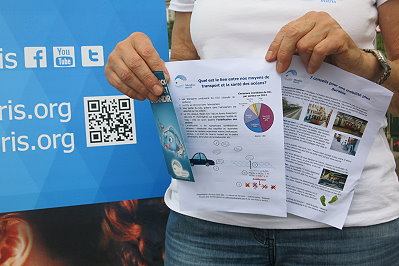 Sunday without cars is a much loved event on the Brussels agenda encouraging families, cyclists and all manner of groups into taking over streets and parks all around town. Mundus maris staffed again an information stand at Merode attracting much attention and a good number of conversations with by-passers.
Sunday without cars is a much loved event on the Brussels agenda encouraging families, cyclists and all manner of groups into taking over streets and parks all around town. Mundus maris staffed again an information stand at Merode attracting much attention and a good number of conversations with by-passers.
"You create your environment - Care for it!" - great success
.jpg) Last Thursday, September 19, 2019, an excellent debate was held between students from various thematic studies throughout the University of Belgrano, who gathered to participate in a role play interpreting the different parties in a conflict of interests
Last Thursday, September 19, 2019, an excellent debate was held between students from various thematic studies throughout the University of Belgrano, who gathered to participate in a role play interpreting the different parties in a conflict of interests
Mundus maris at the FishBase-SeaLifeBase 2019 Symposium in Perth
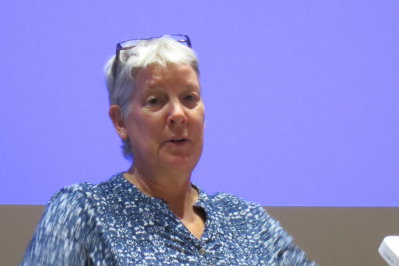 This year's FishBase and SeaLifeBase Symposium stretched over two days and thus offered a wider array of talks and interaction than previous occasions. It took place at the Indian Ocean Research Centre (IOMRC) of the University of Western Australia (UWA), Perth, from 9 to 10 September. Peter Veth, Director, and Jessica Meeuwig, Head of the Marine Futures Lab, welcomed speakers and other participants with the usual "acknowledgement of nation". Read on for a few highlights.
This year's FishBase and SeaLifeBase Symposium stretched over two days and thus offered a wider array of talks and interaction than previous occasions. It took place at the Indian Ocean Research Centre (IOMRC) of the University of Western Australia (UWA), Perth, from 9 to 10 September. Peter Veth, Director, and Jessica Meeuwig, Head of the Marine Futures Lab, welcomed speakers and other participants with the usual "acknowledgement of nation". Read on for a few highlights.
Joint FISON/PESCAO-ECOWAS high profile conference calls for greater collaboration
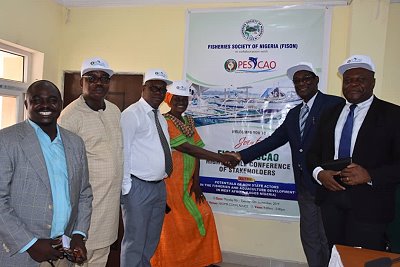 From 9 to 10 September 2019, the Fisheries Society of Nigeria (FISON) and the EU funded “Improving Fisheries Governance in Western Africa Project” (PESCAO)-ECOWAS met in the premises of the Nigerian Institute for Oceanography and Marine Research in Victoria Island, Lagos, to discuss potential for action of non-state actors in fisheries and aquaculture in West Africa.
From 9 to 10 September 2019, the Fisheries Society of Nigeria (FISON) and the EU funded “Improving Fisheries Governance in Western Africa Project” (PESCAO)-ECOWAS met in the premises of the Nigerian Institute for Oceanography and Marine Research in Victoria Island, Lagos, to discuss potential for action of non-state actors in fisheries and aquaculture in West Africa.
Testing training methods during the pilot phase of the SSF Academy in Senegal
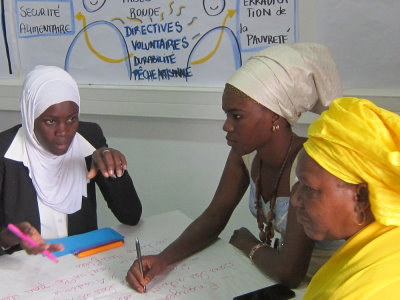 Readers will recall the launch of the small-scale fisheries (SSF) academy in Senegal end of 2018 as a concrete contribution towards the implementation of the SSF Guidelines. A large group of men and women from all segments of the sector and all regions of the country, sector administrators and academics had ensured a broad-based adherence to the idea and developed recommendations for activities. The next step
Readers will recall the launch of the small-scale fisheries (SSF) academy in Senegal end of 2018 as a concrete contribution towards the implementation of the SSF Guidelines. A large group of men and women from all segments of the sector and all regions of the country, sector administrators and academics had ensured a broad-based adherence to the idea and developed recommendations for activities. The next step
Mundus maris supports WIOMSA's push for greater gender awareness
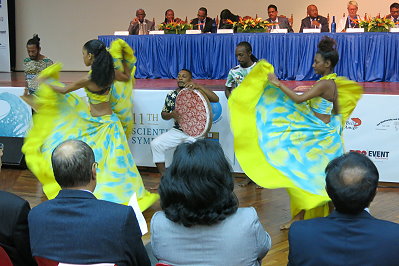 WIOMSA, the Western Indian Ocean Marine Science Association, convened it's 11th symposium from 1 to 5 July 2019 in Port Louis, Mauritius. The Organising Committee had invited Cornelia E Nauen of Mundus maris to deliver a keynote address on gender issues to support its own efforts to raise awareness on the topic. Starting with the opening with dance programme, four days of keynotes, parallel sessions of oral presentations on a wide array of marine issues with focus on the region and crammed poster sessions gave way to this keynote and a large number of special sessions mostly in an interactive format on day 5.
WIOMSA, the Western Indian Ocean Marine Science Association, convened it's 11th symposium from 1 to 5 July 2019 in Port Louis, Mauritius. The Organising Committee had invited Cornelia E Nauen of Mundus maris to deliver a keynote address on gender issues to support its own efforts to raise awareness on the topic. Starting with the opening with dance programme, four days of keynotes, parallel sessions of oral presentations on a wide array of marine issues with focus on the region and crammed poster sessions gave way to this keynote and a large number of special sessions mostly in an interactive format on day 5.
Pre-Symposium Workshop on gender
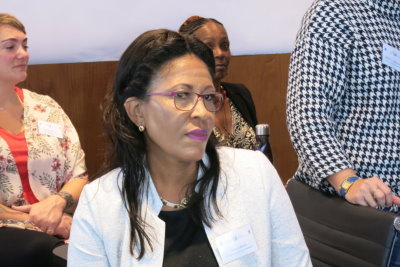 On the 30th of June, as a WIOMSA pre-symposium activity, Women in Marine Science Network (WiMS), in collaboration with Mundus maris, hosted a workshop to discuss the gender dimension in marine science and practice. About 30 women, leading researchers, academics, scientists, policy makers, practitioners and students from Kenya, Madagascar, Mauritius, Mozambique, Seychelles, South Africa, Reunion (France) and Tanzania came together to explore “what could we start to do here and now together towards gender equity in the context of our work on conservation and sustainable use of the Western Indian Ocean?”
On the 30th of June, as a WIOMSA pre-symposium activity, Women in Marine Science Network (WiMS), in collaboration with Mundus maris, hosted a workshop to discuss the gender dimension in marine science and practice. About 30 women, leading researchers, academics, scientists, policy makers, practitioners and students from Kenya, Madagascar, Mauritius, Mozambique, Seychelles, South Africa, Reunion (France) and Tanzania came together to explore “what could we start to do here and now together towards gender equity in the context of our work on conservation and sustainable use of the Western Indian Ocean?”
Lively exchanges at the MARE X Conference in Amsterdam, 25-28 June
